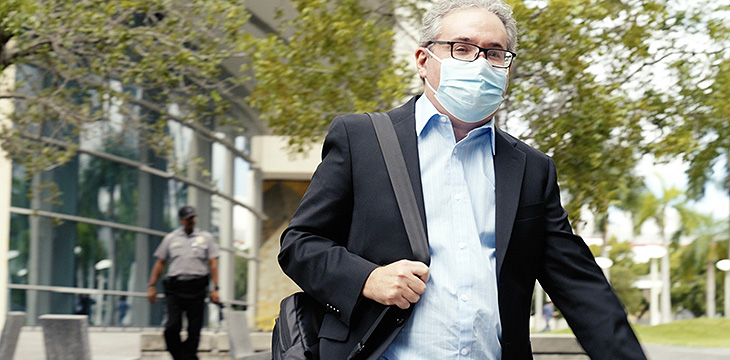|
Getting your Trinity Audio player ready...
|
Ira Kleiman has filed a six-page grievance with the U.S. District Court in charge of his failed case against Dr. Craig Wright, complaining that he is “left feeling like justice has not been served due to the estate not receiving adequate representation.”
Kleiman has been angling for a do-over ever since his years-long, multi-billion dollar piece litigation against Dr. Wright turned into almost nothing: Kleiman was unable to convince a Florida jury that his late brother had anything to do with Dr. Wright’s invention of Bitcoin, only managing to secure a $100 million judgment for W&K—a company owned by Dr. Wright and his family. He has since filed an appeal (despite Kleiman’s attorneys taking a victory lap on Twitter after trial).
You’d think Ira’s claim of inadequate representation would centre around the explosive Crypto Leaks scandal from last year, in which Kyle Roche (the lawyer in charge of Ira’s lawsuit) was caught on camera bragging about abusing the legal system to attack the competitors of the firm’s key ‘crypto’ client, Ava Labs.
Not so: Ira is accusing his attorneys (Roche Freedman, now known as Freeman Normand Friedland) of sabotaging their own case by withholding evidence he believes would have won them the hundreds of billions of dollars that were at stake back at trial:
“At this point, I honestly don’t believe they want to recover the W&K judgment,” he writes.
The evidence mostly consists of supposed correspondence between Kleiman and Dr. Wright in the years leading up to trial, emails which Ira says proves that Dr. Wright owed the Dave Kleiman estate a share of the Bitcoin, software and intellectual property which arose from Dr. Wright’s invention of Bitcoin.
But as Dr. Wright maintained throughout trial, the record is replete with forgeries. Indeed, in Ira’s own letter he quotes Dr. Wright’s pre-trial deposition in which Roche Freedman attorneys asked about one of these very emails. Dr. Wright’s response was clear:
“It is my testimony that this is a fraudulently fabricated document involving Ira and other people that I was not involved in the sending of.”
Which is probably why Ira’s attorneys never floated these particular emails at trial: they would have been well aware that many of the documents and emails were fraudulent (and were perhaps even forged by Kleiman’s star witness, Jamie Wilson) because they spent a significant chunk of the trial on the testimony of Dr. Matthew Edman, who appeared for the plaintiffs and told the jury that 40 or so emails he reviewed were indeed forgeries. This was a so-what moment on at the time given that Dr. Wright has been the one insisting that much of the evidence on the record are forgeries, and even more so after it was shown that the forged emails Edman had analysed were done from an Australian suburb far from where Dr. Wright lived at the time.
Of course, the emails the plaintiffs had Edman review were a selection hand-picked to portray Dr Wright as the forger, but this charade collapsed at trial when one of the key emails in Kleiman’s case (which the plaintiffs conspicuously failed to have Edman examine) was shown to have been forged. It was an email which showed Dr. Wright inviting Ira’s brother to participate in the Bitcoin project back in 2008: the problem was that the email came from Dr. Wright’s @rcjbr.org address, which is an initialism based on the names of his wife and children. Dr. Wright didn’t meet his wife until 2010, two years after the email was supposedly sent, so not only was this a clear forgery, it had to have been forged by someone other than Dr. Wright.
Ira’s latest gambit is surely doomed given that Ira, like any good client, entrusted the finer points of trial strategy to Roche Freedman, and in light of what we now know about the forgeries they wouldn’t have done his case any good in the first place.
But at the same time, it’s easy to sympathise with Ira’s frustration: after all, that strategy netted nothing for Ira besides years of wasted time and a $100 million judgment in favor of Dr. Wright’s company.
It’s also easy to see why he believes his attorneys had no interest in Ira’s claims from the start. How else should Ira view the Crypto Leaks scandal, where Ira would have seen the man in charge of his case bragging about using straw plaintiffs to go after ‘crypto’ competitors on behalf of one of their other clients? Why else, as was revealed in the wake of trial, would they advise Ira to turn down a $3 billion settlement and insist on dragging the parties through an extended trial?

 02-13-2026
02-13-2026 




